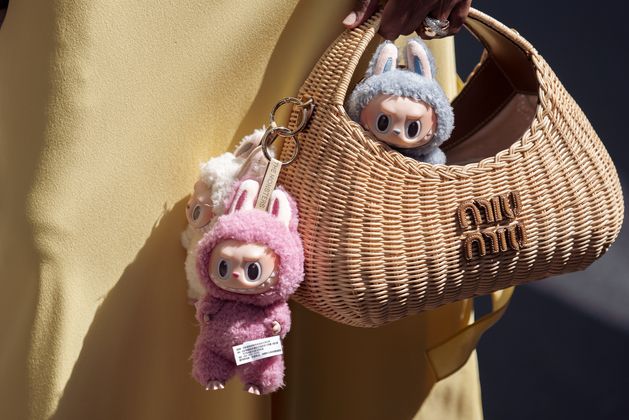No handbag is complete without a little monster, so who and what is fuelling the charm trend? Orla Dempsey reveals all
For those of you not familiar, Sonny Angels originate from Japan. They have cute rosy cheeks, some form of hat and are usually trouser-less. Very odd when written out, but to look at they’re adorable. Part of the appeal of these ‘blind box’ collectibles is that you can’t see into the box that they come in, so you don’t know which specific one you’re going to get from the general theme you’ve chosen. I complimented Isobel’s bag charm, and then joked about how many she had: her house is covered in them. They’re not only keychains, people also stick them on shelves, laptops – any surface really.
A Sonny Angel doll display in China. Photo: Edmond So via Getty Images
She informed me she had got an ultra-rare one which she bought for €15.90, but can be sold for around €150 online. Apparently bag charms are big business!
If naked baby charms aren’t your, ahem, bag, there’s many more options. Jellycat stuffed animals – meant for kids but beloved by adults – have also hopped on the bag charm bandwagon, offering a wide range priced from €23-€30. Maybe you need a grumpy cloud to adorn your Birkin? Or you could keep it classic with a fluffy bunny. Or perhaps a monkey that sucks his thumb? In that case, look no further than a Monchhichi, the cute primate doll that first launched in 1974 whose latest incarnation is in keychains that start at around €20. Monchhichi hails from Japan, which is also the home to Sanrio, the company that created characters like Hello Kitty (also born in 1974) and Cinnamoroll, which are both popular for bag charms.
However, today’s most in-demand charms come from China. Labubus were created by Hong Kong artist Kasing Lung in 2015 but only recently sprung into mainstream popularity after Rihanna and K-Pop star Lisa, from band Blackpink, paired them with their designer bags.
A woman carries a Hermés bag with a Labubu charm at Paris Fashion Week. Photo: Raimonda Kulikauskiene via Getty Imagesfor
Little monsters inspired by Nordic fairy tales, these guys look like they’re up to no good! You can buy a Labubu surprise box on popmart.com for €19.20 – if you’re lucky enough to find them in stock. The retailer recently halted selling the toys in its UK stores due to reports of fights between customers when new stock dropped.
If you can’t find the real deal, there’s always ‘Lafufu’ – the name by which fake Labubus have become known. Yes, these little guys are in such high demand they’re being counterfeited. Curious, I bought one from a store on Dublin’s Moore Street. Just like a counterfeit handbag, it had all the tags included: a Pop Mart logo, a Kasing logo stamped on the foot and branding sewn onto the keychain strap. One major difference was that mine came in a clear box, so it wasn’t a surprise. Probably for the best: I recently saw a TikTok of two girls unboxing their ‘Lafufu’ in the city centre. It looked nothing like the pictures listed on the box, one eye was bigger than the other and its feet were twisted in opposite directions… ouch.
I’m undecided about this trend. On one hand, these charms are a symptom of late-stage capitalism. We’re collecting items that are essentially worthless once they’ve been opened, and we’re encouraged to buy them in mass – the more hanging off your purse the better.
On the other hand, I think people are just trying to have fun. In a world that feels increasingly dark, why not have a silly little monster attached to your bag? Plus, there’s always a cheaper Lafufu. I can’t guarantee his eyes, or even his limbs, will even be facing in the right direction… but doesn’t that add to the charm?



